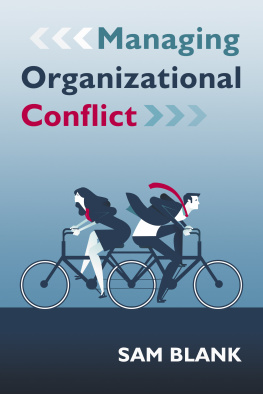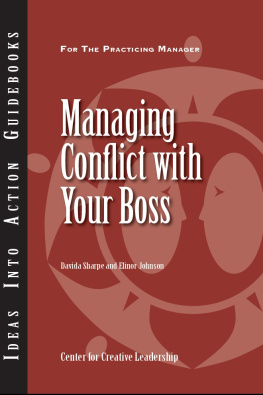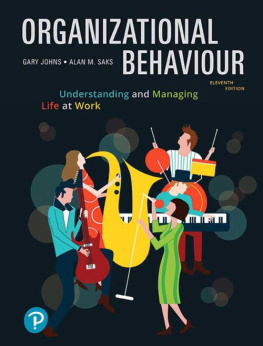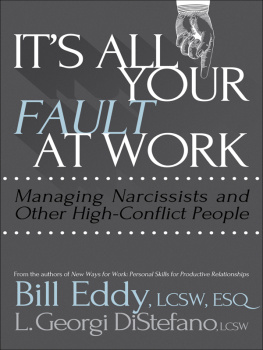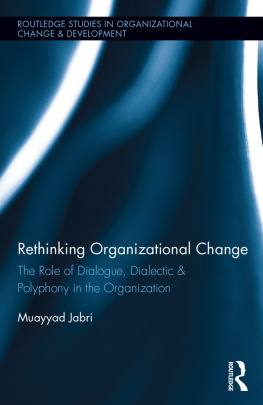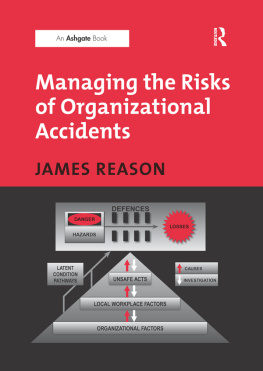Sam Blank - Managing Organizational Conflict
Here you can read online Sam Blank - Managing Organizational Conflict full text of the book (entire story) in english for free. Download pdf and epub, get meaning, cover and reviews about this ebook. year: 2020, publisher: McFarland & Company, Inc., Publishers, genre: Business. Description of the work, (preface) as well as reviews are available. Best literature library LitArk.com created for fans of good reading and offers a wide selection of genres:
Romance novel
Science fiction
Adventure
Detective
Science
History
Home and family
Prose
Art
Politics
Computer
Non-fiction
Religion
Business
Children
Humor
Choose a favorite category and find really read worthwhile books. Enjoy immersion in the world of imagination, feel the emotions of the characters or learn something new for yourself, make an fascinating discovery.
Managing Organizational Conflict: summary, description and annotation
We offer to read an annotation, description, summary or preface (depends on what the author of the book "Managing Organizational Conflict" wrote himself). If you haven't found the necessary information about the book — write in the comments, we will try to find it.
Managing Organizational Conflict — read online for free the complete book (whole text) full work
Below is the text of the book, divided by pages. System saving the place of the last page read, allows you to conveniently read the book "Managing Organizational Conflict" online for free, without having to search again every time where you left off. Put a bookmark, and you can go to the page where you finished reading at any time.
Font size:
Interval:
Bookmark:

Managing Organizational Conflict
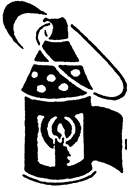
McFarland & Company, Inc., Publishers
Jefferson, North Carolina
This book has undergone peer review.
Library of Congress Cataloguing-in-Publication Data
Names: Blank, Sam, 1947 author.
Title: Managing organizational conflict / Sam Blank.
Description: Jefferson, North Carolina : McFarland & Company, Inc., Publishers, 2020. | Includes bibliographical references and index.
Identifiers: LCCN 2019047015 | ISBN 9781476678924 (paperback) ISBN 9781476637907 (ebook)
Subjects: LCSH: Conflict management. | Communication in management. | Organizational change.
Classification: LCC HD42 .B583 2020 | DDC 658.4/053dc23
LC record available at https://lccn.loc.gov/2019047015
British Library cataloguing data are available
ISBN (print) 978-1-4766-7892-4
ISBN (ebook) 978-1-4766-3790-7
2020 Sam Blank. All rights reserved
No part of this book may be reproduced or transmitted in any form or by any means, electronic or mechanical, including photocopying or recording, or by any information storage and retrieval system, without permission in writing from the publisher.
Front cover illustration 2020 Shutterstock
Printed in the United States of America
McFarland & Company, Inc., Publishers
Box 611, Jefferson, North Carolina 28640
www.mcfarlandpub.com
For tremendous love and support of all kinds, I thank my wife Ellen Afromsky, my brother Ralph, and my children Leah and Matthew
In writing this book, I have many people to thank. I would like to thank my colleagues and good friends who encouraged me along the way and who have shared with me their experiences and taught me meaningful lessons: David Avdul, Alan Borer, Richard Bradley, Jennifer Brady-Cotter, Tzu-Wen Cheng, David W. Fuchs, Eva Kolbusz-Kijne, Susana Powell, Ellen Raider, Kerry Ruff, Maria Volpe, and Norman Wechsler.
I appreciate and am grateful to the mentors that have shaped me to be the person I am today: Constance Bernardi, DeWitt Clinton High School; Thomas Bloch, Stuttgart, Germany; Joseph A. DeVito, Hunter College; William E. Hug, Teachers College, Columbia University; Michael Pritchard, Heartland Media; and Sandra Sollod Poster, Borough of Manhattan Community College.
Special acknowledgments must go to my students who over the past years have provided the inspiration essential to this kind of task. I am indebted to my cadre of stellar communication studies students at the Borough of Manhattan Community College of the City University of New York: Ryan Bias, Jennifer Cachola, Andrea Cano, Nechama Gluck, Anne Goren, Margarita Khodzka, Maria Camila Martinez, Daniel Murphy, Juliette Perez, Iva Porfirova, Elizabeth Shin, Anastasia Sidorenkova, and Natasha Sokorina.
Thanks are due as well to my colleagues at the American Management Association whose valuable input was always welcomed and to my colleagues at the New York City Department of Education, Office of the Manhattan Superintendent who collaborated with me in the administration of the District Conflict Resolution Centers initiative and the District School Leadership Team.
This is a book about positive conflict resolution strategies that stimulate innovation and growth where companies can look to synergistic solutions to common issues and needs. It examines the dysfunctional outcomes of organizational conflicts that result in job stress, reduced communication between individuals and groups, and the fostering of a climate of distrust, where working relationships are damaged and job performance is reduced.
The current matrix structure that has been adopted by many companies has resulted in increased competition for resources, unclear reporting lines, and general confusion and varying management styles. A strong need exists to examine the basic tenets of conflict, organizational behavior and conflict management that are vital to the overall success of the organization.
The book is apportioned to address five objectives that are targeted to (1) aid organizations and individuals to recognize and accept conflict, whether internal or external; (2) examine and successfully manage the unavoidable aspect of conflict in organizational life; (3) view the organizational process within ethical, moral and human issues and act in a conflict prevention mode, rather than an intervention mode; (4) foster a company culture that uses conflict resolution approaches that incorporate proactive confrontational innovation and design; and (5) reexamine and provide a new model for the role of the company conflict management.
The concepts presented in this book were fashioned after spending more than 25 years as a mediation and negotiation trainer and teaching at the Graduate School of Educational Leadership of Pace University and the City University of New York. In my professional career, I have found that it is not only necessary to provide learners with concrete knowledge, but it is also essential to challenge them to use and adapt the materials to fit into their own lives and connections. I had a desire to author a book in organizational conflict that would accompany and complement my consultative work with business executives, administrators and management personnel. It is central that readers view the contents of this book within the overall picture of the many complexities of changing organizational structures and environments.
There are very few books on the market today that address the prevalent occurrence of organizational conflict, and, in fact, this area only received cursory mention in human relations textbooks and organizational behavior and design texts. The field of conflict and crisis management is certainly supported by a very long history of research, yet there are only three titles I found available that address conflict in organizations.
They are Managing Conflicts in Organizations by M. Afzalur Rahim, published by Routledge in 2010; Crisis in Organization by Laurence Barton, published by South-Western in 2001; and Hostage at the Table: How Leaders Can Overcome Conflict, Influence Others, and Raise Performance by George Kohlrieser, published by Jossey-Bass, 2006.
This book is written in an informative and conversational style which includes many opportunities to examine and practice conflict resolution in ten case studies and engage in stimulating role plays. This book has added sections on areas of leadership and organization development, active listening and communication, managing generational differences, and fostering collaborations. It offers insights for company professionals who are tasked with managerial decisions and problem-solving. All the material was created and designed to assist organizations to meet conflict head-on and bring issues to resolution.
In the United States, over a decade ago, employees spent close to three hours per week dealing with conflict and 25 percent of employees avoided conflict by calling in sick or being absent from work. Most of the U.S. workforce have never received conflict management training. There is a special aptitude needed to successfully work disputes through to resolution, and this book can help leaders improve their connection and interaction skills by applying solid conflict management strategies and tactics.
The material is written for many different groups. The primary audiences for this book are employees, executives, business owners, managers, team leaders, and human resource personnel. Studying and pursuing a focus in conflict resolution, organizational behavior, negotiation, crisis management, and change management will improve communication and increase productivity. A secondary market for this book is the undergraduate and graduate college student studying business management, crisis intervention and prevention, organizational and industrial psychology, and team and leadership development.
Font size:
Interval:
Bookmark:
Similar books «Managing Organizational Conflict»
Look at similar books to Managing Organizational Conflict. We have selected literature similar in name and meaning in the hope of providing readers with more options to find new, interesting, not yet read works.
Discussion, reviews of the book Managing Organizational Conflict and just readers' own opinions. Leave your comments, write what you think about the work, its meaning or the main characters. Specify what exactly you liked and what you didn't like, and why you think so.

